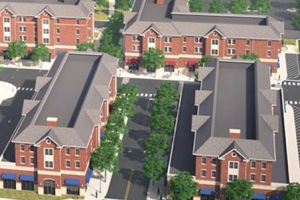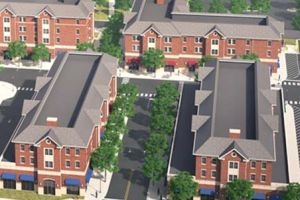
Young adults have strong feelings about lifestyles, and that is impacting university campuses in very significant ways. In fact, it is literally changing the playing field when it comes to recruiting new students.
Most residence halls and campus dormitories that once were adequate are no longer competitive. A new trend has emerged – one that is extremely attractive to prospective students. Many universities are now collaborating with private-sector partners to build student resident facilities in New Age mixed-use developments. The facilities are more like private residential housing and all offer modern, state-of-the-art amenities.

Rendering of Campus Town from The College of New Jersey
The College of New Jersey’s “Campus Town” is a prime example. A 100 percent privately financed mixed-use development, Campus Town is not only popular with students but to the community as well. The $120 million development was seven years in the making. Almost 450 two- and four-bedroom apartments were leased within three months of opening and another $30 million has been allocated for a second phase of housing. Each apartment is furnished and residents can have private bedrooms and attached bathrooms, full kitchens, living rooms and laundry rooms.
Campus Town also features a variety of retail outlets including nationally known restaurants, sandwich shops and coffee vendors. There is a branch bank, a fitness center and a national book store chain. Other retail business announcements are anticipated soon.
The University of Texas at Austin has adopted a slightly different approach but will also provide amenity-laden housing for students. UT will partner with a private-sector developer for another high-rise student housing project. The development will include more than 200 one-, two-, three- and four-bedroom units. Amenities associated with the 22-story tower will include a fitness center, media room, rooftop swimming pool and study lounges. It will also provide four levels of underground parking.
At Texas A&M University, a public-private partnership (P3/PPP) was created to construct a $360 million Park West development that includes an eight-story building with more than 1,800 beds for students, a parking garage, fitness center and other amenities. The complex will feature two additional buildings with 500 beds each and townhouse-style, one-, two- and three-bedroom furnished flats with features such as walk-in closets and full kitchens. The flats will offer several swimming pools, outdoor grills, fire pits, study lounges, fitness centers, a convenience store and state-of-the-art technology features.
The Biscayne Bay campus of Florida International University plans an August opening of its nine-story, state-of-the-art apartment complex for students. The $60 million project will add 410 beds in more than 150 two- and four-bedroom apartment units. Billed as a “living/learning community,” the facility will also include four classrooms, a sky lounge and common spaces for students. Amenities include a swimming pool, fitness center and a business center with computers. The apartments are furnished and feature full kitchens and technology enhancements such as numerous USB chargers throughout the residences.
Change has come quickly to college campuses and competition for new students could not be keener. Many parents are hesitant to describe the places they lived as students for fear they will not be believed.
Federal projections indicate that college enrollment will rise 14 percent through 2022. That means the need for student housing on college campuses will increase exponentially, opening the door for P3s/PPPs. Most new facilities will involve innovative collaboration to create more than just “traditional” student housing.
SPI’s newsletters are excellent sources of news about public-private partnerships. Subscribe here.
